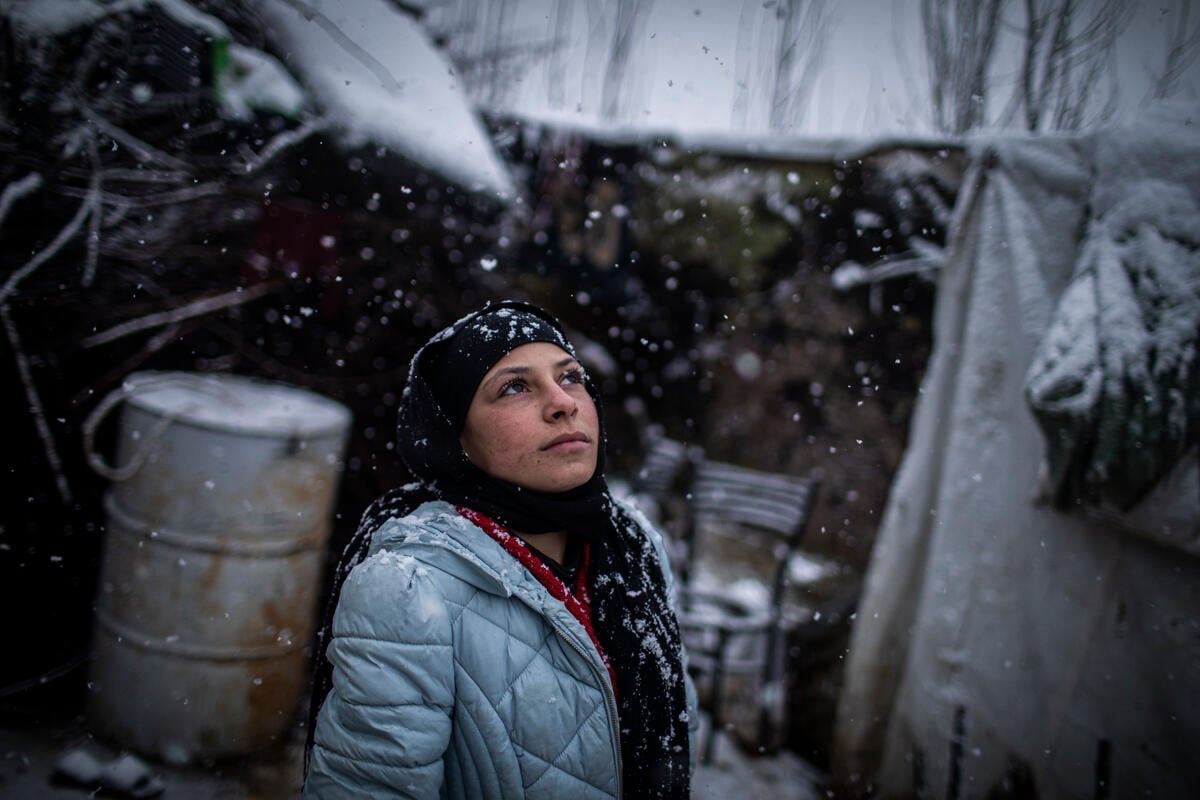Jordan's Za'atari refugee camp takes off
Jordan's Za'atari refugee camp takes off

ZA'ATARI REFUGEE CAMP, Jordan, September 27 (UNHCR) - Last Tuesday handsome Mohammed, 23, with dark hair and a well-trimmed beard, married his 17-year-old love, Semah. They gathered with friends and neighbours in a small caravan in Jordan's Za'atari refugee camp, 15 kilometres from the Syrian border to celebrate their nuptials.
Mohammed crossed into Jordan from Dara'a, Syria seven months ago, still mourning the death of his older brother and the loss of the family home. Upon arrival he found the camp a tangle of desperate humanity. People, it seemed, were only looking out for themselves.
Now, neighbours share sugar, soap and other household goods. Tea and Syrian sweets were served at the wedding, along with a modest meal. The desert sprawl of tents and aluminium dwellings feels more like a community.
"Here we help each other. We sit together and work together," Mohammed said. "When somebody needs something we help him. That makes us a community."
As Za'atari camp enters its second year of existence, social bonds frayed by the terror of war are beginning to repair themselves. The local wedding shop is doing business like never before - at least 10 brides each week are looking to rent a wedding gown for US$45 per day so they can celebrate their marriage in dignity.
Whereas six months ago civil society was largely groups of smugglers and other mafias, now the camp social norms are increasingly governed by groups of elders who see their role as guiding Za'atari, as they would have in Syria. "We are from different villages, but now we're starting to come together," says Abu Shaker, a 47-year-old community leader at Za'atari.
When Abu Shaker arrived in Za'atari 11 months ago, he would have described the camp as "a jail." Now he sees it as an embryonic society. "It is not as though we are from this village or from that village," he added. "It is like we are from one village now. Our Za'atari village."
Za'atari, which houses some 120,000 refugees, has always been a hub of commercial activity. The camp's Champs-Elysees section is home to more than 1,000 street businesses, everything from pawn shops to barber shops. But now the sense of community extends well beyond the role of street shops.
With the help of UNHCR partner IRD, community members, many of them former teachers in Syria, have established a fledgling library. "We don't want people here to forget the importance of reading," says Abdul Karim Hariri, 23. "There are a lot of people who have free time in Za'atari. They come here and read a book. It's nice to read."
Killian Kleinschmidt, UNHCR's 51-year-old German coordinator of Za'atari camp, is elated by the progress. Only a few months ago, he and others were besieged by Za'atari residents on a daily basis.
Thing came to a head after a fire destroyed four tents, killing four young brothers. It was at that point, during the anger and grief, that community residents and UN workers came together. "We needed to talk," says Kleinschmidt. "Things couldn't continue."
While UN agencies and NGOs were providing critical services - hospitals, water and sanitation among others - there was a clear need for a closer relationship and better governance. In response, the camp was subdivided into 12 neighbourhoods to provide community spaces and create closer links. Soon, each neighborhood will be governed by eight different committees, charged with addressing everything from school enrolment to health issues. After months of painstaking discussions, the camp began to flower.
Initial successes have led to increasing buy-in. Earlier this month, the Dutch development minister came to visit and arrangements are now being made for the city of Amsterdam to provide technical expertise for Za'atari. During the same period, a German entrepreneur proposed establishing windmills across the camp to generate electricity for its residents.
Approximately 10 kilometres of new roads will be constructed over the coming months for camp residents. Taekwando trainers from South Korea now teach the children martial arts. And a team from UEFA (Union of European Football Associations), provided through the assistance of Jordan's Prince Ali Bin Al-Hussein and UEFA President Michele Platini, has come to train Za'atari residents as football coaches. Already, the camp has five sports fields and 10 football teams.
To be sure, it's hard to define anything as normal when thousands of refugees must cope daily with the memory of war and lost loved ones. And each night a thunderstorm of mortar and artillery fire can be heard across the border in Syria.
"It's a testament to these refugees that they have managed to create so much, so fast under such conditions," says Kleinschmidt. "We are really beginning to see the fruits of our hard labour. Things are really taking off."
By Gregory Beals in Za'atari Refugee Camp, Jordan









